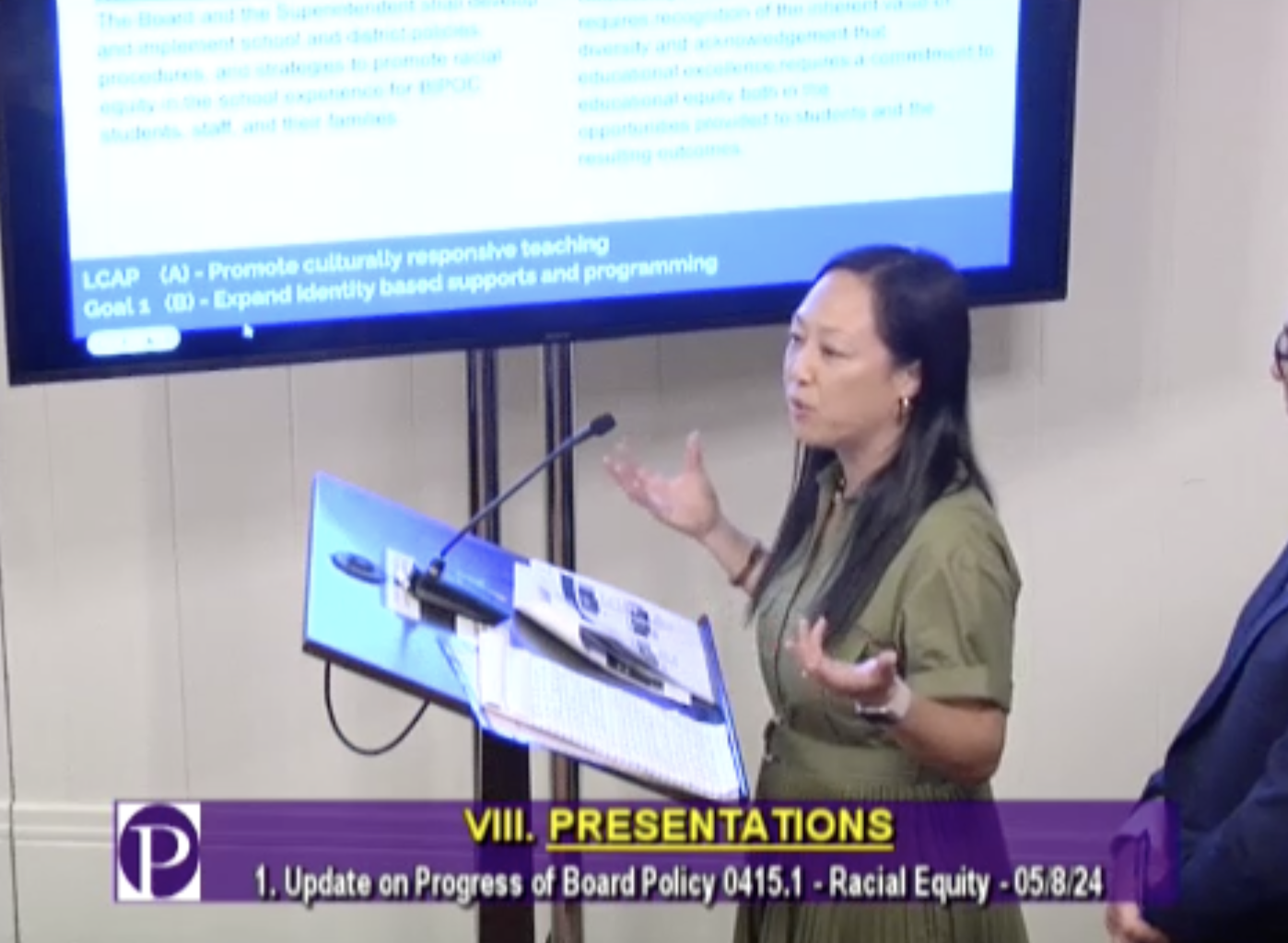Diversity, equity, inclusion and belonging initiatives in other parts of the state and country may be under threat, but in Piedmont, DEIB work in the schools appears to have robust support from the Board of Education, district leadership, teachers, parent groups, and students. That endorsement was on full display at the May 8 Board of Education meeting when trustees received a progress report on the district’s racial equity and educational equity policies from Assistant Superintendent Ariel Dolowich and DEI Director Jean Takazawa, and heard from a range of school community members who spoke in favor of the district’s efforts to create a more inclusive environment.
PUSD’s work to advance racial equity policies began in earnest in 2020 in the wake of the George Floyd protests. The school board officially adopted a racial equity policy focused on Black, indigenous and other students of color in September 2020. It was part of a package that also included an educational equity policy that covered a broader category of groups and identities, covering race, ethnicity, religion, gender, sex orientation, economic class, physical and cognitive abilities.
“Vague expressions of diversity, equity, and inclusivity did not effectively address the context and persistent negative impact of systemic racism on people of color,” said School Board President Veronica Anderson Thigpen, explaining why the district adopted the policies to begin with. “Hate crimes are on the rise in the country,” she said, citing FBI statistics.
Wednesday’s presentation outlined some of the concrete DEIB steps the district has undertaken since 2020, and also included a summary of the DEIB action plan Takazawa created in November 2023. Some of those measures the district has taken so far, said Dolowich, include updating required classroom reading to include a diverse range of authors, auditing and removing outdated curriculum, creating a DEI council, updating hiring practices to attract more BIPOC educators and staff, restorative justice circles, creating a “culture of kindness” at an early level, and more. (See the full presentation HERE.)
“Everything I do is focused on creating inclusive spaces for students,” said Takazawa, who said a student DEIB advisory council is a critical part of understanding school climate. “It is also imperative that I include our staff and community in this work. Our goal is to fight institutional racism, to make PUSD inclusive and welcoming to BIPOC students and staff, and eradicate opportunity gaps for BIPOC students.”
Takazawa founded PUSD’s Affinity Mentorship program in 2019 and was appointed to her current role in June 2023. The Affinity Mentorship program connects high school mentors with middle and elementary school students who meet regularly to talk about racial and cultural affinities, gender identity, and neurodiversity. Affinity circles for students and families of color have grown over four years. (Takazawa was recently selected as one of Diablo Magazine’s “Beacons of Change” for her DEIB work in Piedmont.)
“This is not work to be held by one person,” said Takazawa. “I am not alone… we know that our community is behind this work and that is the only way I am hopeful. We are a community of diverse families.”
Superintendent Dr. Jennifer Hawn said that since 2020 the district has started to include equity language into interview questions and added it to job postings and said she has been reaching out to universities in an effort to attract a more diverse teaching staff. Dolowich and Hawn said data — from surveys, academic assessments, and school climate reports by site — will help the district determine how well they’ve met their goals.
“I am happy to see all the work that has come from this,” said Trustee Cory Smegal, who was on the board when the policies were originally crafted. “There was a whole committee that came together to do this. It was not easy, there was a lot of back and forth. This work is hard… it’s hard for everyone. As a community we all have to work on this.”
“I am proud that we are doing this work at the district and that you are working with strong, passionate students who have different beliefs and different points of view,” said Trustee Hilary Cooper.
Following the presentation, parents, teachers, and students spoke for an hour, describing how important the district’s DEIB work has been for them, with students sharing personal stories of how Takazawa’s support has positively impacted their school experience.
“I’m grateful for the progress, particularly with the affinity mentorship program,” said Piedmont Anti-Racism and Diversity Committee President Ellen Lee, calling on everyone in the school district to support this work and for the district to develop plans to retain and hire diverse staff.
Havens Elementary School Principal Anne Dolid said the district’s policies have made it possible to make the school a welcoming place for all students. “One of the most incredible moments of my career has been watching the affinity mentorship program grow,” she said.
PUSD Board of Education Student Representative Elena Stevens said what she has appreciated the most about DEI work is how it can bring conversations into the classroom “when teachers aren’t afraid to hold discussions that could be deemed controversial, and create a space where students feel safe to share their opinions and learn to disagree respectfully.”
MHS Student Representative Shakila Zuberi said Takazawa encouraged her to get involved with student government and the affinity mentorship program. “That sparked my journey to become a leader,” she said. “I appreciate your warmth and caring.”
Trustee Ruchi Medhekar said DEI work is necessary in the district because incidents continue to occur in the school district. “The ‘B’ part of DEIB is important to me. How can we make sure everyone feels like they belong.”
“There’s been a lot of noise” around what’s happening with DEIB, said Trustee Lindsay Thomasson. “This presentation helped me cut through the noise and understand what is actually happening.”
